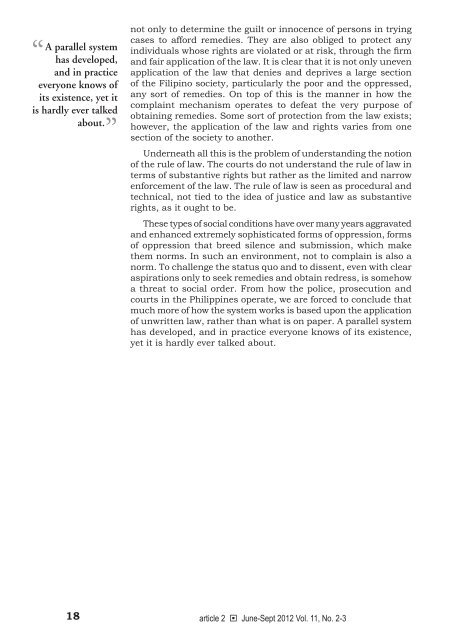You also want an ePaper? Increase the reach of your titles
YUMPU automatically turns print PDFs into web optimized ePapers that Google loves.
“<br />
A parallel system<br />
has developed,<br />
and in practice<br />
everyone knows of<br />
its existence, yet it<br />
is hardly ever talked<br />
about.<br />
18<br />
”<br />
not only to determine the guilt or innocence of persons in trying<br />
cases to afford remedies. They are also obliged to protect any<br />
individuals whose rights are violated or at risk, through the firm<br />
and fair application of the law. It is clear that it is not only uneven<br />
application of the law that denies and deprives a large section<br />
of the Filipino society, particularly the poor and the oppressed,<br />
any sort of remedies. On top of this is the manner in how the<br />
complaint mechanism operates to defeat the very purpose of<br />
obtaining remedies. Some sort of protection from the law exists;<br />
however, the application of the law and rights varies from one<br />
section of the society to another.<br />
underneath all this is the problem of understanding the notion<br />
of the rule of law. The courts do not understand the rule of law in<br />
terms of substantive rights but rather as the limited and narrow<br />
enforcement of the law. The rule of law is seen as procedural and<br />
technical, not tied to the idea of justice and law as substantive<br />
rights, as it ought to be.<br />
These types of social conditions have over many years aggravated<br />
and enhanced extremely sophisticated forms of oppression, forms<br />
of oppression that breed silence and submission, which make<br />
them norms. In such an environment, not to complain is also a<br />
norm. To challenge the status quo and to dissent, even with clear<br />
aspirations only to seek remedies and obtain redress, is somehow<br />
a threat to social order. From how the police, prosecution and<br />
courts in the Philippines operate, we are forced to conclude that<br />
much more of how the system works is based upon the application<br />
of unwritten law, rather than what is on paper. A parallel system<br />
has developed, and in practice everyone knows of its existence,<br />
yet it is hardly ever talked about.<br />
article 2 � June-Sept 2012 Vol. 11, No. 2-3


